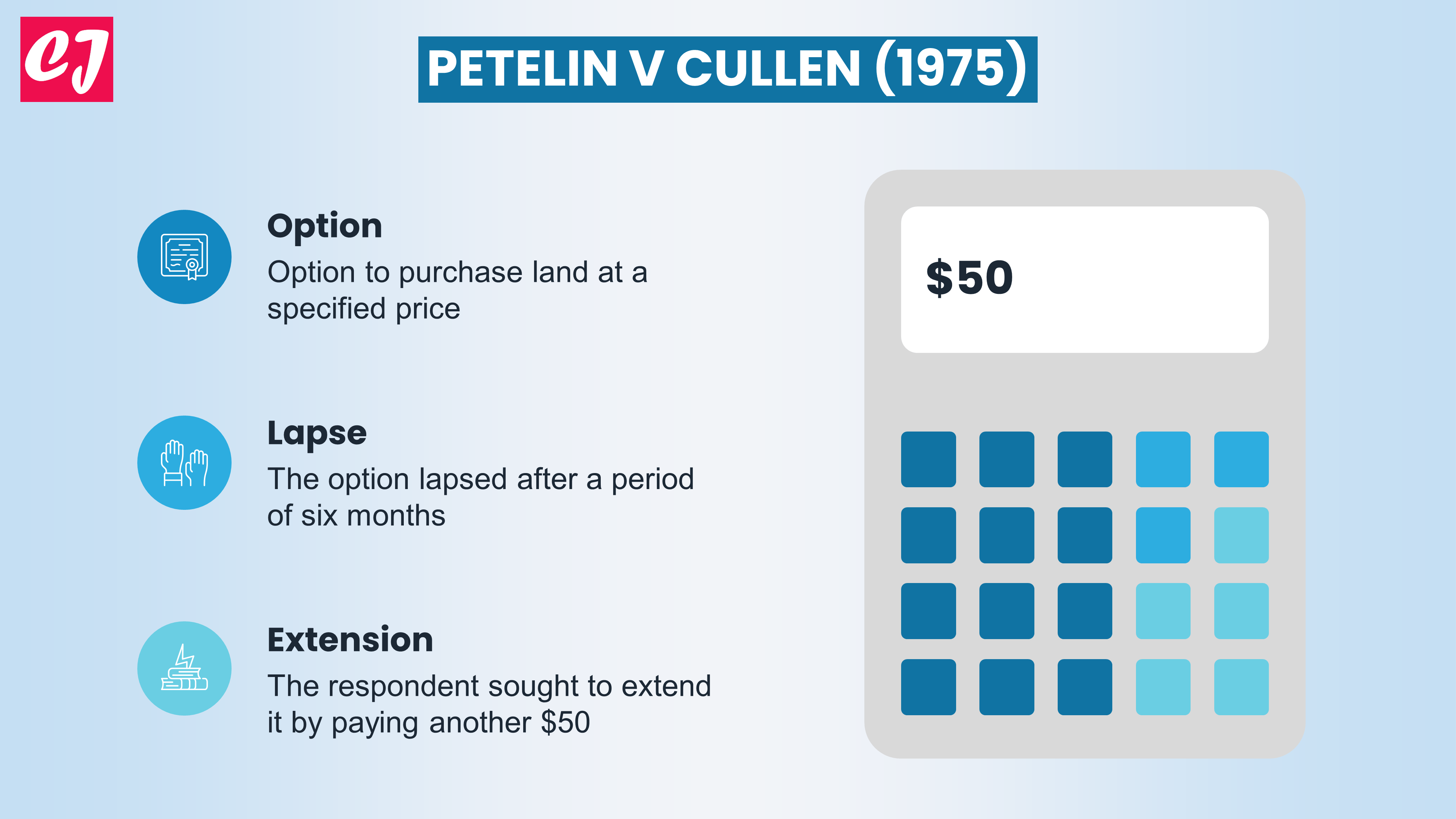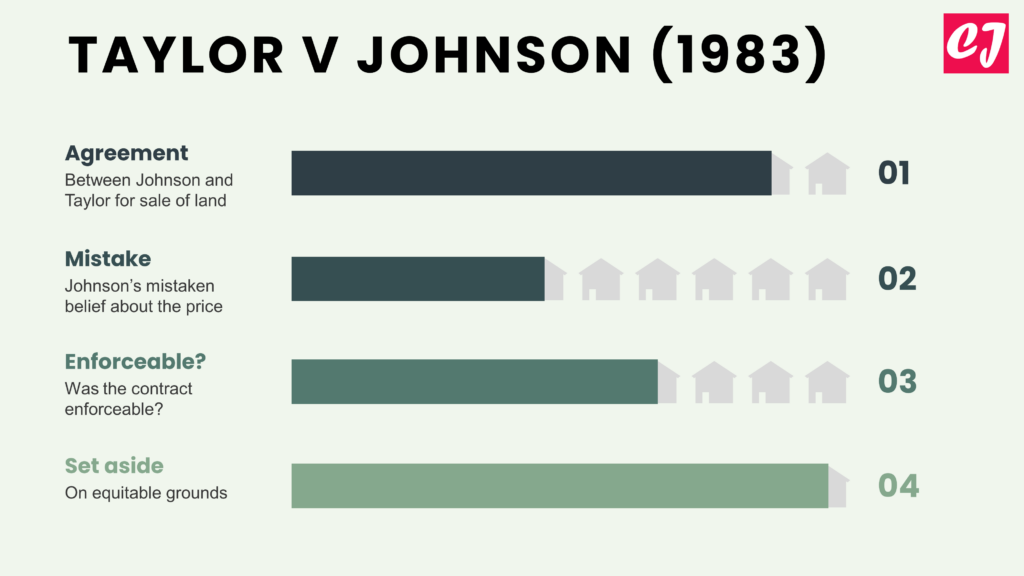
Petelin v Cullen (1975): A Detailed Case Summary
Petelin v Cullen (1975) is a contract law case from Australia that threw light on the defense of non est factum.
Given below are the case details.
Case name & citation: Petelin v Cullen [1975] HCA 24; (1975) 132 CLR 355
- Court: High Court of Australia
- Decided on: 17 July 1975
- The bench of judges: Barwick C.J., McTiernan, Gibbs, Stephen and Mason JJ.
- Area of law: Defense of non est factum; Contract for sale of land
What happened in Petelin v Cullen?
Petelin was the owner of the land at Liverpool. He spoke little English and couldn’t read English. He received a sum of $50 from Cullen and, in exchange, gave Cullen an option to purchase his land at a specified price. The option was valid for six months. Six months lapsed. Cullen, through his agent, then wrote a letter to Petelin enclosed with another check of $50 to seek his agreement on the extension of the option for a further period of six months.
Cullen’s agent, Mr. Clements then saw Petelin and asked him if he received the $50 and the letter. Mr. Clements said, “Sign it that you received $50.” Petelin signed the letter, thinking it to be a receipt for the second payment. But the document was actually an extension of the option that had lapsed.
Cullen attempted to exercise the extended option but Petelin refused to make the sale.
Cullen sued for the enforcement of the contract, seeking specific performance in the Supreme Court of New South Wales. The Supreme Court dismissed the action on grounds that Petelin was entitled to the defense of non est factum and an appeal was made to the NSW Court of Appeal. The NSW Court of Appeal overturned the Supreme Court decision and granted an order for specific performance. Petelin then appealed to the High Court of Australia.
Decision of the High Court
The High Court denied ordering specific performance.
The basis for the decision was a unilateral mistake as to the nature of the document signed by Petelin. The document was substantially different from what he believed he was signing.
In regard to the defense of non est factum, the High Court stated certain criteria for a person to be able to rely on this defense.
“It is available to those who are unable to read owing to blindness or illiteracy and who must rely on others for advice as to what they are signing; it is also available to those who through no fault of their own are unable to have any understanding of the purport of a particular document.
To make out the defense a defendant must show that he signed the document in the belief that it was radically different from what it was in fact and that, at least as against innocent persons, his failure to read and understand it was not due to carelessness on his part.
Finally, it is accepted that there is a heavy onus on a defendant who seeks to establish the defense.” (at p360)
Petelin believed he was signing a receipt when actually it was an extension of the period of option. He was poor in English and couldn’t read and understand English. There was no carelessness on his part in failing to take reasonable precautions because it was beyond his capacity to understand the document and he relied on what he was told by Mr. Clements. Taking it to a solicitor would have been too difficult for him.
Furthermore, whether his signing of the document was due to his carelessness was not a relevant issue here because it appears from the circumstances that Cullen’s conduct was not innocent.
The High Court held that:
“It is scarcely to be conceived that the respondent was unaware of what his agent said and did; but even if he was not informed by the agent, he must take responsibility for his action. Consequently, as against the appellant, the respondent is not to be considered as an innocent person without knowledge or reason to doubt the validity of the appellant’s signature.” (at p360)
“There are other reasons why it would be inappropriate to treat the respondent as an innocent party. It became apparent to Mr. Clements when the original option was negotiated that the appellant had little appreciation of English and no capacity to understand the option agreement.” (at p361)
Based on the above grounds, the principle of “non est factum” applied which rendered the contract void ab initio.
Non est factum
This is a legal principle that applies to a unilateral mistake made by a party signing a document where the document is fundamentally and radically different from what the party believed he or she was signing. When “non est factum” is established, the contract becomes void ab initio.
References:
Petelin v Cullen [1975] HCA 24 – barnet jade. (n.d.). https://jade.io/article/66529
Petelin v Cullen [1975] HCA 24: 17 July 1975. Legal Helpdesk Lawyers. (2015, February 26). https://legalhelpdesklawyers.com.au/2014/07/17/petelin-v-cullen-high-court-of-australia-17-july-1975/
The application of the defence of non est factum: An exploration of its … (n.d.). http://classic.austlii.edu.au/au/journals/UWSLawRw/2009/4.pdf
Petelin v Cullen (1975) 132 CLR 355. Law case summaries. (2019, March 10). https://lawcasesummaries.com/knowledge-base/petelin-v-cullen-1975-132-clr-355/
StudentVIP. (n.d.). https://s3.studentvip.com.au/notes/6686-sample.pdf
You might also like:
More from contract law:

